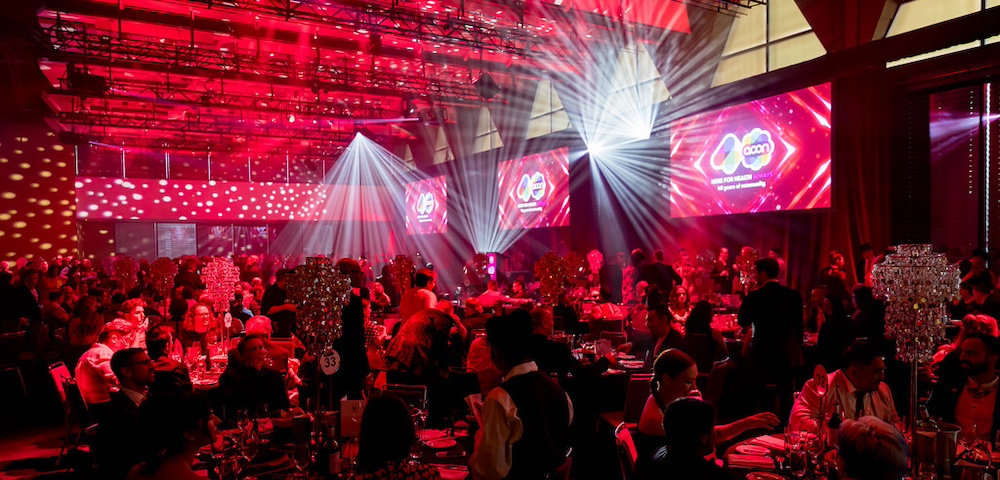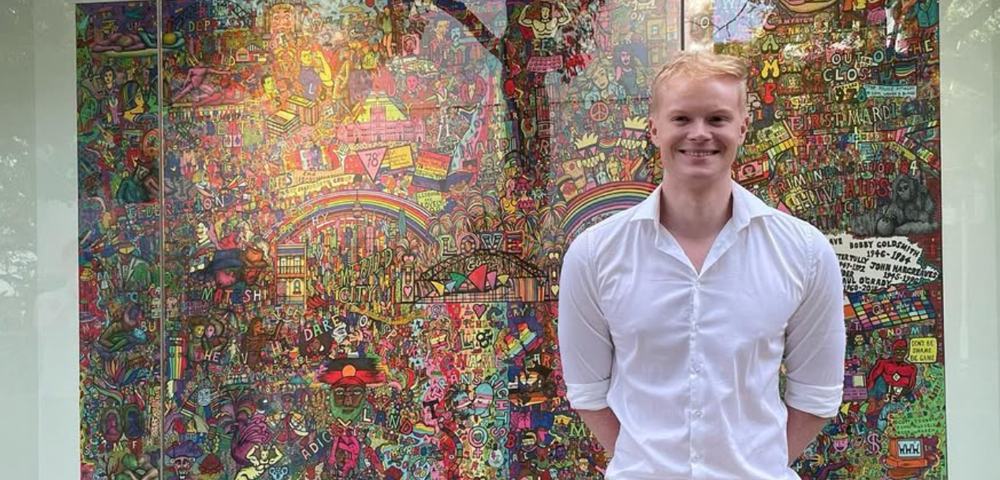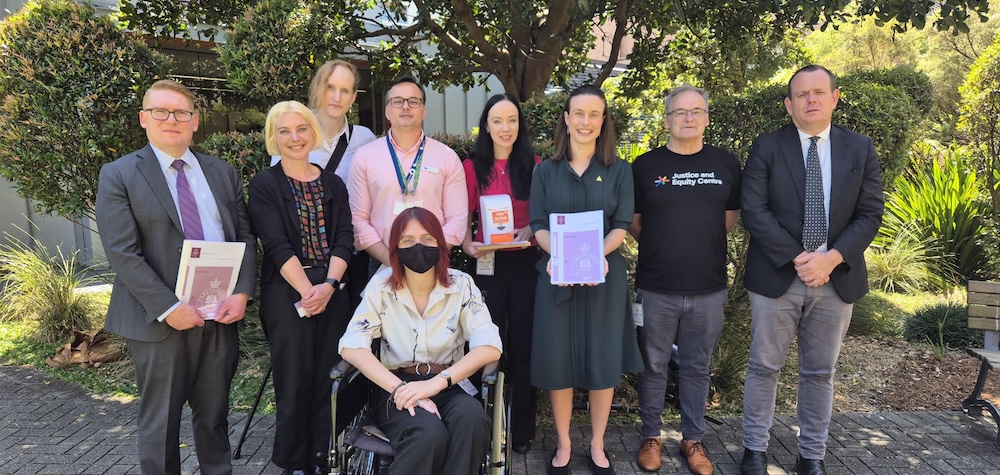
Writing on the body
Jeanette Winterson is late. It’s ten minutes past the scheduled meeting time at the Hotel Intercontinental and there’s no sign. Is that a bad sign? I’m sweating.
A message comes through the Intercontinental Club Lounge receptionist. Jeanette Winterson has been riding up and down in the elevator for 15 minutes looking for me, and would I mind going up to her room?
Jeanette Winterson’s room. Winterson answers the door, hair wet from the shower, wearing one of those FCUK FASHION T-shirts and a pair of cargo pants. She’s tiny, and she races around the room offering drinks and being charming.
Winterson is famous for her books (which include her famous first effort Oranges Are Not The Only Fruit, her breakthrough Written On The Body and her latest, Lighthousekeeping) and her unique way of writing. She writes as if each word is important, each sentence vital. She is famous for her sexuality -“ she sleeps with women, and writes about it, but she isn’t exclusive. She is also famous for the 20 years she has spent rejecting the lesbian lit boxes critics have tried to fit her into. It’s not such of a concern anymore, she says.
There’s gay books and there’s lesbian books, just like there’s crime novels and books about horses. I’ve got no worries about that. But I don’t want to write them.
Besides, she says, she wouldn’t be still around if she only had lesbian readers.
The important thing always is to widen the base, not narrow it, Winterson says.
I hate labels. I hate definitions that are really more like taxidermy. And very often critics treat writers like dead beetles. They want immediately to box them in, because it’s easy and they don’t have to think. I’ve found that people who are paid to think like being paid, but don’t like thinking.
That’s not to say Winterson is closed about her sexuality. There’s a biography on Winterson’s website, in which the writer describes herself as a working class Northerner, who left home at 16 after falling in love with a woman.
I love women, they’re great. They are, on the whole, my preference sexually and emotionally. But that doesn’t leave out the other half of the world who bring me a lot of pleasure.
It seems to me that we’re beginning to understand rigid gender roles are very dull. They don’t describe the human condition. I think that homosexuality and heterosexuality are kinds of psychoses on either end of the spectrum. And somewhere in the middle is the truth about our lives, she says.
I don’t live in a world where I look at men and think I can’t find them attractive or I don’t enjoy their company or I don’t like them. I don’t want to live in a world like that. I don’t want to be that person.
Winterson’s frankness has gotten her into trouble in the past, particularly in the UK. She has been described in The Guardian as a pretentious writer and an egomaniac. After her early success the British critics turned on her – they asked her questions, then turned on her honest answers.
During Adelaide’s recent Writer’s Week, she talked in front of a crowd of 2000 and sold so many books her publishers had to do an extra print-run.
When Oranges Are Not The Only Fruit was published in 1985, Winterson received a thousand pounds, which she was thrilled about. She bought some nice Christmas presents and a new pair of boots. It was not until 1992’s Written On The Body that she made a living from writing. Not surprisingly, Winterson finds the idea of being a celebrity author kind of funny.
My career has spanned the enormous change in the writers’ status, she says.
When I began writers were not celebrities. Writers were what they really are, which are introverted nobodies. Nobody had a clue what writers looked like, no matter how long they’d been working. No matter how well they’d done or how many books they’d published they were unknown.
And that was rather good, because at least it gave you space to work quietly, and I think when you’re a new writer that’s important because you have to steady yourself and find your voice. Writers do have a strange celebrity status. What they don’t have because they don’t make enough money is the PR machinery to go with it.
That’s why writers always look so terrible in photographs, because nobody’s doing their hair and make up. It’s not like Victoria Beckham, is it, who spends $25,000 a year getting her hair done. I come out of the shower and I’m still damp.
Writing Oranges-¦ as a 24 year old not thinking about quality control at all, Winterson had no expectations for the book. But she knew it was different, and she knew what she was attempting to do.
I wanted to reinvent the memoir, I wanted to collapse the obvious forms of autobiography and fiction, because I think that’s been one of the interesting things about the 20th century – that all of those old, rigid definitions have collapsed, across all of the arts.
It always seemed to be the men who had ambition -¦ and a very straight forward love of language, and women always seemed to have to have some political agenda or social conscience. And I thought, -˜well, I haven’t got any social conscience or political agenda, so I’ll see what I can do with the form in a very clean, pure way’. And I was interested in literature, and I still am.
In work, you have to decide where your loyalties lie and my loyalties lie completely for language.
Her latest book Lighthousekeeping is about a young girl’s apprenticeship to a blind lighthouse keeper and is a reference to survival of the fittest, the theory behind Charles Darwin’s Origin Of The Species.
Machines are much more efficient than human beings, so following the argument through logically, human beings should become redundant. And I’m wondering when we will halt that process. At present we’re not halting it at all. I don’t know who’s going to be doing any work anywhere soon.
They’re going to have planes without pilots, everything’s going to look like Yo Sushi and be going round on a sinister conveyor belt. There’ll be one lone chef somewhere in the background chopping bits of salmon, she says.
Where are all the people going to go? I’m baffled by this.
Lighthousekeeping is for everyone, she says. Her reputation as a difficult read does not apply to her latest work. Although there are literary tricks along the way -“ designed to slow the reader down -“ it is unlikely to attract any complaints about pretension.
I put in those interventions so you can’t just skip to the next line, because I think it’s important. I care very much about language. I think that preciseness in a world of approximations is very important. Language isn’t approximate; there’s a huge vocabulary that’s available.
I don’t want this shrinking vocabulary, where people use repetitive cycles and wrong mundane words which they hope will describe everything. It’s rather like having an old useless toolkit to try and do precision engineering. You can’t. You need something much more sophisticated. And it’s there. But we have to use it. It’s the job of writers, I think, to keep it expanding when the media would like to see it shrink, she says.
I want life to be rich and full and challenging. Because life is difficult. When people say they’re struggling with life, I think -˜good. You should be.’ Life is a struggle.
Winterson does not know what her next novel will be about or even if there will be one. The idea for it will either come to her or it won’t, she says.
The clich?s if the muse deserts you then you’re fucked. And I don’t know if she will or she won’t, because she’s fickle.
Lighthousekeeping by Jeanette Winterson is available at The Bookshop, Darlinghurst for $27.95 and at good bookstores everywhere.









